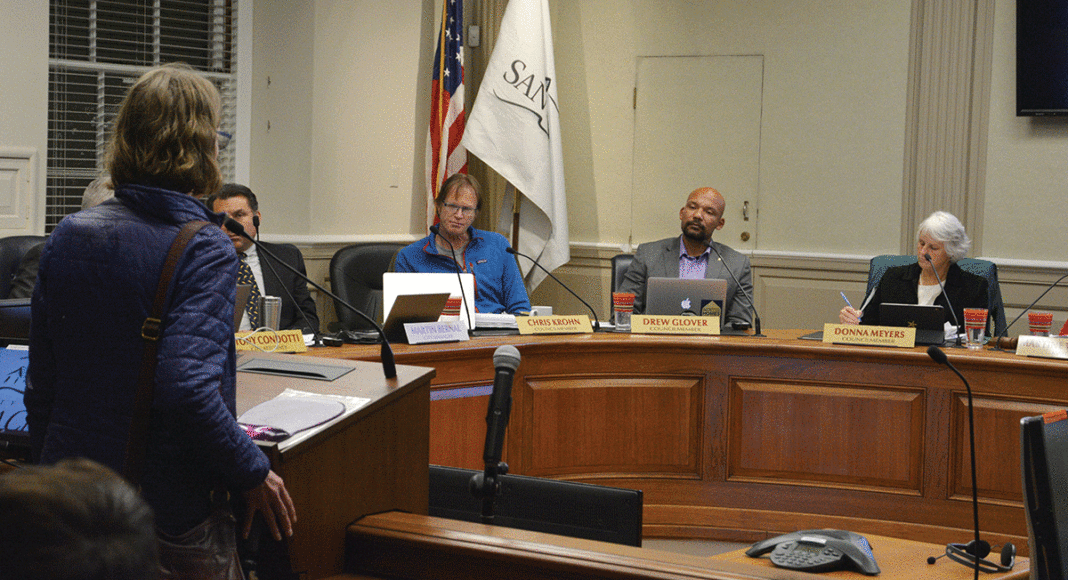At the misty hour of 4 a.m. on Feb. 15, six explosions rocked the 500 block of Windsor Street in the Seabright neighborhood.
Outside, an armored vehicle and a dozen unmarked cars from U.S. Immigration and Customs Enforcement (ICE) surrounded a family home as scared and confused neighbors rushed to see what was happening. The experience brought back memories of the 2017 raids in the Beach Flats, where ICE officials arrested members of the notorious MS-13 gang, along with 11 other undocumented individuals (10 were released shortly after).
With incidents like these in mind, recently elected Santa Cruz City Councilmember Drew Glover has suggested launching a citywide human rights commission, similar to models in San Francisco and Santa Clara County.
The commission, Glover tells GT, would advocate for human and civil rights, as well as investigate and mediate discrimination complaints.
The idea has been on his mind for some time. Glover, a longtime local activist and one of two new African-American members of the council, says people of color experience bigotry more often than white people would expect, both on an individual level and systemically.
Glover believes that if a commission had already been in place, it would have helped quell some of the fear and confusion caused by events like the recent immigration raid. The council has agreed to discuss the raids in a community meeting.
Glover is still working through many of the specifics for how the commission would address problems of bigotry.
Santa Cruz is no stranger to racism and stereotyping. Last November, anti-rent-control flyers circulated around the county with the caption, “Meet Your Neighbors” over a picture of what was implied to be MS-13 gang members. The photo was later revealed to be from a Salvadoran prison. Over the last two years, “It’s OK To Be White” flyers have popped up along the river levy, at bus stops, in the library, and on telephone polls. Glover says it would be “foolish” to ignore that bigotry is becoming more apparent in the community.
He says he’s hopeful that the council will vote as early as April 23 on whether to explore his proposal, and he has a loose archetype for the commission that he’s ready to submit.
The group that he’s proposing would be far more robust than the city’s existing committees. He says it would consist of seven members, each representing a subcommittee focusing on one of the following topics: citizenship issues, the environment, the homeless, people with disabilities, protection against race-based discrimination, and justice issues facing schools and students.
The commission could meet every two months, with the subcommittees meeting in between to report back with recommendations. Once chosen, subcommittee commissioners would go through “comprehensive equity training.”
“All of that can be fleshed out in the conversation on how we want to structure the commission,” Glover says.
One consideration that may weigh on the council is that it isn’t clear how much the commission would cost. Even without the addition of new programs, financial deficits are projected to reappear before long. Despite a successful quarter-cent sales tax approved by voters in June, Santa Cruz is one of many cities feeling the squeeze of growing pension costs. On the campaign trail, Glover invoked a quote often attributed to Martin Luther King Jr. that a budget is a “moral document,” and he has criticized cuts in social services spending.
As to whether this new commission would assist those most in need or just create more bureaucracy, Glover insists that the body would lend needed assistance to marginalized groups.
He isn’t ready to say where he might suggest saving money instead, but when he scans the city budget, he questions “if it represents Santa Cruz values.”
Glover gives the example of the Grille at DeLa, a restaurant at the city-owned DeLaveaga Golf Course, where the city is spending $925,000 on maintenance and renovations that are running more than $600,000 over budget, as the council recently learned when approving a budget allocation. Leaky pipes, termites, dry rot, and a failed deck all contributed to the cost overrun. Public Works Director Mark Dettle says crews worked on the project over several years, and that for future projects, he would like to have his team report back to the council in six-month intervals.
Glover says the city needs to make allocations where it sees the highest need.
“When looking at the needs of the city, I would prioritize human rights and supportive services over something that serves a small percentage of our community,” he explains. “The money is there.”
So far, the City Council seems open to exploring the human rights idea. Glover initially proposed the new commission at the tail end of a discussion about the ICE raids. After the city attorney mentioned that it wasn’t the appropriate time, Glover brought up the idea a few minutes later, during the council’s calendar review. Councilmembers Sandy Brown, Justin Cummings, Donna Meyers, and Cynthia Matthews all spoke positively about the concept, though some council members expressed concern over the budget and wondered if the principles could be worked into existing commissions.
“Establishing a whole new commission, as newer councilmembers will learn, is a big commitment,” Matthews said at the meeting. “It would be worth sitting down and thinking how to incorporate these into already existing commissions and programs.”














